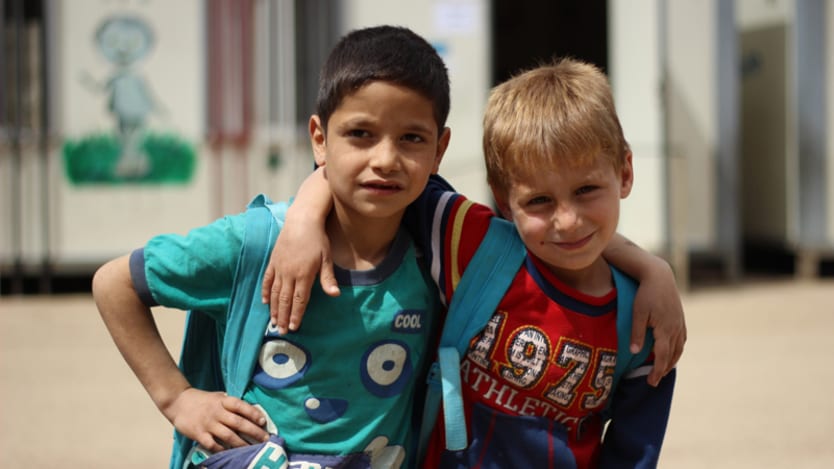
NEW YORK — Education for children in emergencies got a major new push at the United Nations General Assembly, including securing new funding commitments from the European Union and Denmark, among others. Globally, 264 million children and adolescents are out of school, many of them affected by conflict.
“There’s been a very strong push specifically for education in emergencies,” Ted Chaiban, UNICEF’s Programme Director, told Devex. “Right now we’re at 50 percent of refugees overall globally that are in school. We should be going toward 100 percent.”
The European Union promised to increase its education budget from 3.6 percent to 8 percent of humanitarian spending and pledged $13.2 million to Education Cannot Wait, a facility launched in 2016 to support crisis situations. Denmark pledged $16.1 million and Dubai Cares pledged $500,000 to the fund.
Funding has been the primary challenge to providing education in emergencies, and progress is now improving, advocates agreed. “What I’m seeing is that at the political level, there’s this interest in education in emergencies, it’s getting attention,” Dean Brooks, director of the Inter-Agency Network for Education in Emergency, a standards-setting body, told Devex.
See more related stories:
► How Iraq and Syria put psychosocial care into emergency education
► Opinion: The world needs to invest in Iraq's collapsed education infrastructure
► Inside the launch of the Education Cannot Wait fund for crises
► Empowering girls through education in emergency situations
Equally important, advocates say that the attention on education in emergencies has created a window for policy conversations about how to best reach children with reliable and quality education when they are uprooted from their homes. Education providers are struggling with challenges, including how to ensure quality education, how to credential children in informal or non-state-run programs, and how to scale ongoing projects.
“We have a tremendous opportunity to place a spotlight on this issue,” Giulia McPherson, the director of advocacy and operations at Jesuit Refugee Service, said.
One of the primary challenges facing the emergency education sector is how to scale some of the successful programs that have emerged in recent years, including surrounding the Syrian crisis, as well as displacement situations in Africa.
As refugee crises grow increasingly protracted, advocates are looking to national systems in order to integrate refugee children. The sector is moving “more toward integration, instead of creating parallel” education systems, said McPherson. For example in Eastern Chad, camp-based schools had initially taught Sudanese refugees from the Darfur region with their home curriculum. But after 10 years of living in Chad, the schools have recently been switched to the Chadian system.
This answers a subsequent question around how children are credentialed for their studying and how those certifications can be transferred if they return home or otherwise move. Yet many children who still study outside a national system worry about how they will transfer their education if and when they return home.
Groups dealing with the Syrian crisis have worked most seriously to address some of these accreditation and standardization issues. Providers and donors have created the Whole of Syria Education Focal Point to better coordinate and create a platform that could be accepted across regional countries.
Dealing with this challenge is “what refugees and communities are asking for,” said Brooks.
Quality has also dominated conversations at this year’s UNGA; schools can neither be accredited nor useful to children’s economic futures if they don’t meet a minimum set of standards. “There are lots of players out there, and not just multilateral and international NGOs but also local NGOs and local organizations,” Mary Joy Pigozzi, executive director of Educate a Child, a program of Education Above All, told Devex. “Quality is often an issue.”
There is a growing push to build best practices and standards, including through INEE, which hosts a continually growing and updating Toolkit of best practices for programming, ranging from topics such as gender sensitivity to conflict awareness to impact assessment. Just the creation of those guidelines has been a step forward, said Brooks, and proof that a range of sectors are thinking about how to do better.
Read more international development news online, and subscribe to The Development Newswire to receive the latest from the world’s leading donors and decision-makers — emailed to you free every business day.
Search for articles
Most Read
- 1
- 2
- 3
- 4
- 5




